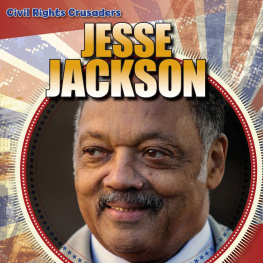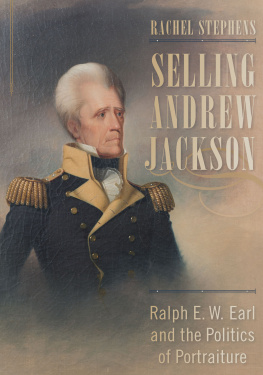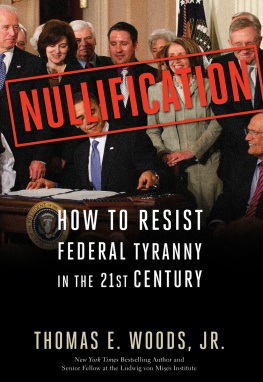PROCLAMATION.
Table of Contents
Whereas , a Convention, assembled in the State of South Carolina, have passed an ordinance, by which they declare, "That the several acts and parts of acts of the Congress of the United States, purporting to be laws for the imposing of duties and imposts on the importation of foreign commodities, and now having actual operation and effect within the United States, and more especially," two acts for the same purposes, passed on the 29th of May, 1828, and on the 14th of July, 1832, "are unauthorized by the Constitution of the United States, and violate the true meaning and intent thereof, and are null and void, and no law," nor binding on the citizens of that State, or its officers: and by the said ordinance it is further declared to be unlawful for any of the constituted authorities of the State, or of the United States, to enforce the payment of the duties imposed by the said acts within the same State, and that it is the duty of the Legislature to pass such laws as may be necessary to give full effect to the said ordinance:
And whereas, by the said ordinance, it is further ordained, that, in no case of law or equity, decided in the Courts of said State, wherein shall be drawn in question the validity of the said ordinance, or of the acts of the Legislature that may be passed to give it effect, or of the said laws of the United States, no appeal shall be allowed to the Supreme Court of the United States, nor shall any copy of the record be permitted or allowed for that purpose, and that any person attempting to take such appeal shall be punished as for a contempt of Court:
And finally, the said ordinance declares, that the people of South Carolina will maintain the said ordinance at every hazard; and that they will consider the passage of any act by Congress abolishing or closing the ports of the said State, or otherwise obstructing the free ingress or egress of vessels to and from the said ports, or any other act of the Federal Government to coerce the State, shut up her ports, destroy or harass her commerce, or to enforce the said acts otherwise than through the civil tribunals of the country, as inconsistent with the longer continuance of South Carolina in the Union; and that the people of the said State will thenceforth hold themselves absolved from all further obligation to maintain or preserve their political connection with the people of the other States, and will forthwith proceed to organize a separate Government, and do all other acts and things which sovereign and independent States may of right do:
And whereas, the said ordinance prescribes to the people of South Carolina a course of conduct, in direct violation of their duty as citizens of the United States, contrary to the laws of their country, subversive of its Constitution, and having for its object the destruction of the Unionthat Union which, coeval with our political existence, led our fathers, without any other ties to unite them than those of patriotism and a common cause, through a sanguinary struggle to a glorious independencethat sacred Union, hitherto inviolate, which, perfected by our happy Constitution, has brought us, by the favor of Heaven, to a state of prosperity at home, and high consideration abroad, rarely if ever, equaled in the history of nations: To preserve this bond of our political existence from destruction, to maintain inviolate this state of national honor and prosperity, and to justify the confidence my fellow-citizens have reposed in me, I, Andrew Jackson, President of the United States, have thought proper to issue this my proclamation, stating my views of the Constitution and laws applicable to the measures adopted by the Convention of South Carolina, and to the reasons they have put forth to sustain them, declaring the course which duty will require me to pursue, and, appealing to the understanding and patriotism of the people, warn them of the consequences that must inevitably result from an observance of the dictates of the Convention.
Strict duty would require of me nothing more than the exercise of those powers with which I am now, or may hereafter be invested, for preserving the peace of the Union and for the execution of the laws. But the imposing aspect which opposition has assumed in this case, by clothing itself with State authority, and the deep interest which the people of the United States must all feel in preventing a resort to stronger measures, while there is a hope that anything will be yielded to reasoning and remonstration, perhaps demand, and will certainly justify, a full exposition, to South Carolina and the nation, of the views I entertain of this important question, as well as a distinct enunciation of the course which my sense of duty will require me to pursue.
The ordinance is founded, not on the indefeasible right of resisting acts which are plainly unconstitutional and too oppressive to be endured; but on the strange position that any one State may not only declare an act of Congress void, but prohibit its execution; that they may do this consistently with the Constitution; that the true construction of that instrument permits a State to retain its place in the Union, and yet be bound by no other of its laws than those it may choose to consider as constitutional. It is true, they add that, to justify this abrogation of a law, it must be palpably contrary to the Constitution; but it is evident, that to give the right of resisting laws of that description, coupled with the uncontrolled right to decide what laws deserve that character, is to give the power of resisting all laws. For, as by the theory, there is no appeal, the reasons alleged by the State, good or bad, must prevail. If it should be said that public opinion is a sufficient check against the abuse of this power, it may be asked why it is not deemed a sufficient guard against the passage of an unconstitutional act by Congress. There is, however, a restraint in this last case, which makes the assumed power of a State more indefensible, and which does not exist in the other. There are two appeals from an unconstitutional act passed by Congressone to the judiciary, the other to the people and the States. There is no appeal from the State decision in theory, and the practical illustration shows that the Courts are closed against an application to review it, both judges and jurors being sworn to decide in its favor. But reasoning on this subject is superfluous when our social compact in express terms declares, that the laws of the United States, its Constitution and treaties made under it, are the Supreme law of the landand for greater caution adds, "that the judges in every State shall be bound thereby, anything in the Constitution or laws of any State to the contrary notwithstanding." And it may be asserted, without fear of refutation, that no federative government could exist without a similar provision. Look for a moment to the consequences. If South Carolina considers the revenue laws unconstitutional, and has a right to prevent their execution in the port of Charleston, there would be a clear constitutional objection to their collection in every other port, and no revenue could be collected anywhere, for all imposts must be equal. It is no answer to repeat, that an unconstitutional law is no law, so long as the question of its legality is to be decided by the State itself; for every law operating injuriously upon any local interest will be, perhaps, thought, and certainly represented, as unconstitutional, and has been shown, there is no appeal.











